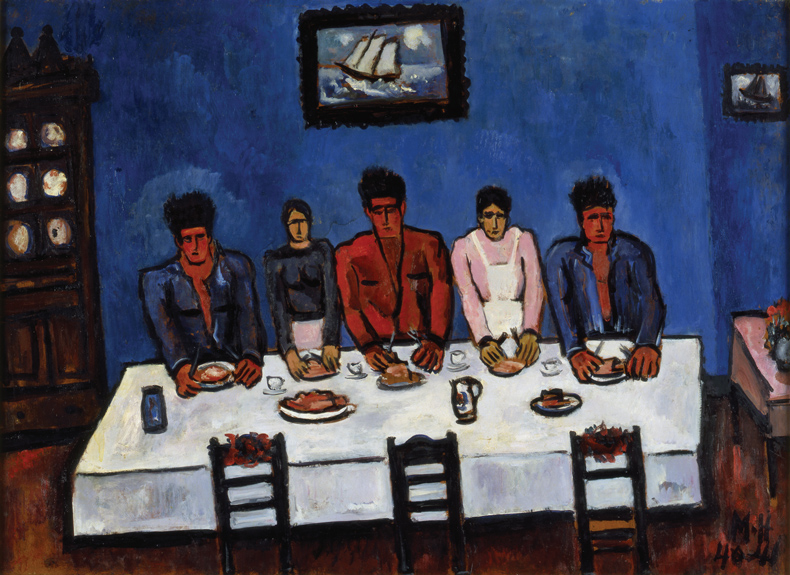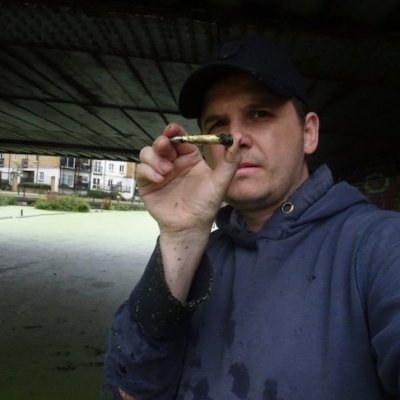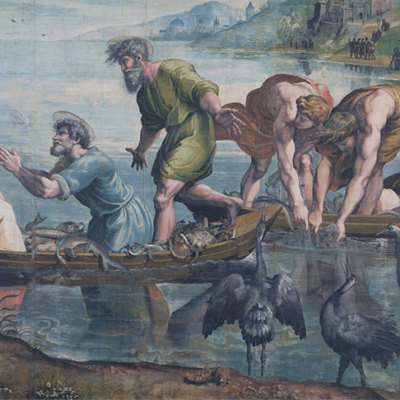From the January 2024 issue of Apollo. Preview and subscribe here.
About 30 years ago, I encountered Marsden Hartley’s Fishermen’s Last Supper (1940–41) for the first time. It grabs you from across the room. Even out of the corner of your eye, the deep colour and the jangling movement of these five little figures facing us across a dinner table will draw you to it.
Whatever relation Hartley intended to Christ’s last supper (his religious sense was vague), there is an underlying spiritual energy. Two years earlier, he had painted another version: the background is sky blue and over some of the heads glimmer halo-like stars. He did a number of drawings of similar fishermen; in one, a figure in the foreground is draped across the knees of the others, as in a pietà.
At this point in his life, Marsden Hartley had finally found sexual freedom, of a kind, surprisingly among the people of Maine. There is a point in his work where the male physique becomes massive; you can sense his relief in his sketchbooks.
In Fishermen’s Last Supper, the men are brawny, constrained by their clothing, yet at this formally set table they seem humble, at rest, even contrite. There’ll be no rowdiness tonight. The two women, one diminutive, both a little downtrodden, nonetheless have bodies that offer a different kind of competence and strength.
You ask yourself, what is this slant? Why is the table canted? Are they on their boat? No, they are at home, snug – the china hutch, flowers on a side table. But the slant of the scene, the skewed furniture and the slight leaning of the men and women in their chairs still suggest the sea: it’s always going to be there, and within them. It follows them home. Look at the contrary tack of the boat in the picture behind them: we, and they, are being pulled in several directions at once. It’s giddying.
One of Hartley’s early paintings, Handsome Drinks (1916), is a still life of a black cafe table (perhaps in Paris, a place he never liked) on which are four or five vibrant Jazz Age cocktails. He made quite a study of tables and what was on them – fish, glasses, plates and flowers are often present.
To compare the superficial glow of those Gatsby-style cocktails to the sturdy table here, covered with the family’s white cloth, is to see not only the evolution in Hartley’s life, from a superficial urbanity to a Thoreau-inspired communion with nature, but an emotion under the surface in this room and in these people. You can feel the solid table and chairs, their permanence, their insistence; the nap of that table cloth.
They’re drinking out of coffee cups so is that dessert in front of them? Americans used to drink it with every course. The colours of the meal merge with the complexions of the women’s faces. The men, though, are an alarming red – a bold assertion of the weather-beaten. Their hair, which Hartley often drew in this way, looks electric, like George S. Kaufman’s hair. The hair is part of the energy, the glow of this piece, stemming from their fearful lives on the boat and subsequent grace, evidenced in the calm and order of the table. The wall, like the night sky, is now dark blue; the glimmering stars are gone this time, possibly painted over.
Fishermen’s Last Supper (1940–41), Marsden Hartley. Neuberger Museum of Art, Purchase College, New York

The facial expressions seem sketchy at first, but the women are resolute, resigned. The man on the left, perhaps the youngest, gazes at us with an adolescent wryness; the man in the middle, by far the reddest (the skipper?), has the look of the perpetually worried small businessman. Maybe it’s the middle brother, there on the right, who is just happy to be home.
You can almost see Fishermen’s Last Supper as a 1930s movie (think Captains Courageous). The MGM lion roars … the boat is tossed in spray … the chap on the left, young though he is, has the muscle to battle the sea at the helm, just as in the picture in their little dining room. The tall red man is on deck, heaving away with his brother at the nets. This is why they look this way: fear that never quits. On the shore, the women try to peer through mist. And now they’ve survived all that and they are safe, home, some of their own catch on their plates. Music, end title. In between voyages, there has been life, romance, family. Fishermen never mention their terror, and neither do these.
From the January 2024 issue of Apollo. Preview and subscribe here.


